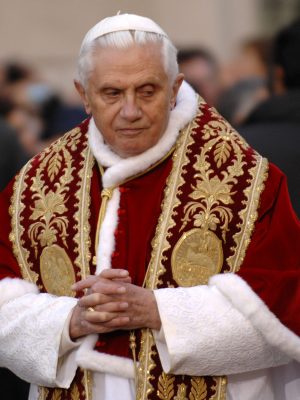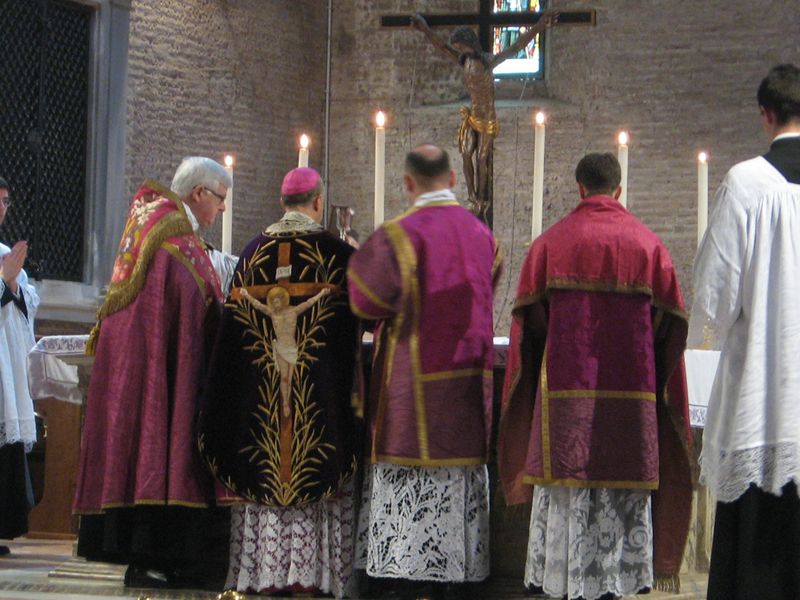When all is said and done, it’s all about good and evil. Those, like Nietzsche, who say otherwise are themselves evil. And, as Solzhenitsyn reminds us, the battle between good and evil takes place in each individual human heart.
There is, therefore, no escaping this battle because it is being fought within our very core, within the very heart of ourselves.
The spirit of good is the Holy Spirit. The spirit of evil is the spirit of the world. Both these spirits are present in our hearts, at all times, and it’s merely a question of which of them we choose to serve. Nor can we serve both masters, as Christ tells us.
We cannot serve both God and Mammon any more than we can serve both good and evil. We must choose the side on which we fight. Who will we allow to rule our hearts? The Heilige Geist or the Zeitgeist? The Holy Spirit or the Spirit of the Age?
This battle between good and evil, between God and Mammon, between the Heilige Geist and the Zeitgeist, is made manifest in the perennial battle between traditional orthodoxy and modernist heresy, between the protection and preservation of the deposit of faith, as Saint Paul teaches (2 Timothy 1:14), and its abandonment to fads and fashion.
The first sees time as being subject to unchanging truth, the other sees truth as being subject to changing time. The first desires a Church that will move the world, the second a Church that will move with the world.
It is this understanding of reality that animates the teaching of Pope Benedict XVI. This is why one of the chapters in my new book, Benedict XVI: Defender of the Faith, is entitled “Heilige Geist or Zeitgeist?” Pope Benedict made it his mission to serve the Holy Spirit by battling the Spirit of the Age.
He did so by being a champion of what he called the Hermeneutic of Continuity, in which the Church always remains true to the timeless and seamless truth She has always taught, as opposed to what he termed the Hermeneutic of Discontinuity and Rupture, in which the Church is “reimagined” in accordance with the Spirit of the Age.
He saw tradition and truth as being wedded in an indissoluble union, the one being the living expression of the other. To abandon tradition was to abandon truth. To abandon what the Church has always taught in order to embrace what the world is currently teaching is to abandon the Church herself.
Pope Benedict, knowing that the treasure of the true Christian can only be found with God in Heaven, was uncompromising in opposing those who served Mammon or Eros, especially those who served Mammon or Eros in God’s name.
“The world waxes indignant when sin and grace are called by their names,” he wrote, adding that it was time for Christians to reacquire “the consciousness of belonging to a minority and of often being in opposition to … that mentality which the New Testament calls – and certainly not in a positive sense – the ‘spirit of the world’.”
This call to the spirit of opposition to the world, pro Ecclesia contra mundum, epitomizes Benedict’s love affair with the things of heaven, a love affair which animates his opposition to modernism’s duplicitous love affair with the spirit of the age. It is Benedict’s love affair with the things of heaven which leads him to insist that the Church is not merely the “People of God”, as the modernists proclaim, but the Body of Christ.
Since the Church is not a sociological collective of believers but is the living God made manifest in His Mystical Body, it was not possible for any self-proclaimed “people of God” to make the Body of Christ into their own image or to “reimagine” Him in conformity with the spirit of any age, least of all our own particularly deplorable epoch. The Church “is not our Church, which could be disposed of as we please,” Benedict insisted. She does not belong to the people of God, the people of God belong to Her. “She is … His Church.”
The spirit of worldliness within the Church, which is made manifest in modernism, can only be countered by a spirit of other-worldliness, a spirit of sanctity.
“Saints … reformed the Church … by reforming themselves,” Benedict reminds us. “What the Church needs in order to respond to the needs of man in every age is holiness….” The Church does not need modernists calling for the power of the people, she needs saints, the true people of God who live and love in communion with the Mystical Body of Christ.
And so we return to where we started. It’s all about the battle between good and evil. As Pope Benedict reminds us, the Church doesn’t need programs, or committees, or bureaucracy, she needs saints. “The Church, I shall never tire of repeating it, needs saints more than functionaries.”
If the Church needs saints, she needs us to become saints. Just as the battle between good and evil begins in every human heart, so the desire to become a saint begins in every human heart. The gates of hell will not prevail because of the love of God and the lives of the saints who are in love with God. In this, as in so much else, Benedict XVI shows us the way.
To purchase Benedict XVI Defender of the Faith, see the TAN Books website.
On December 30th there will be a TAN Talks Webinar with the author Joseph Pearce speaking with fellow author Julia Meloni on the subject of the St. Gallen Mafia and the question of whether or not it forced Pope Benedict XVI to resign the Papacy under duress. Join authors Joseph Pearce and Julia Meloni to hear them debate this puzzling question among other topics – please remember to register!






